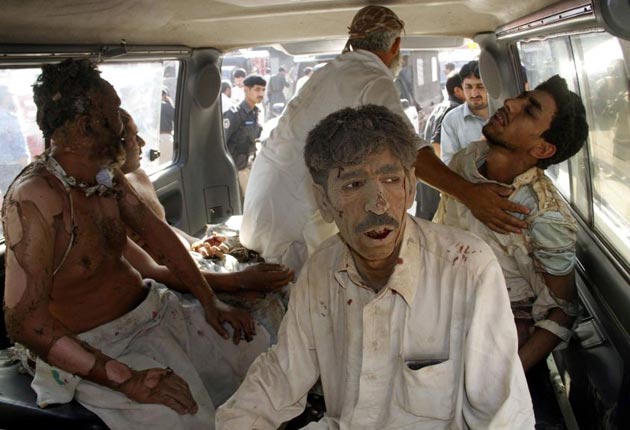Taliban kill 80 in Bin Laden revenge attack
Two suicide bombers strike in Pakistan as recruits leave paramilitary centre

Your support helps us to tell the story
From reproductive rights to climate change to Big Tech, The Independent is on the ground when the story is developing. Whether it's investigating the financials of Elon Musk's pro-Trump PAC or producing our latest documentary, 'The A Word', which shines a light on the American women fighting for reproductive rights, we know how important it is to parse out the facts from the messaging.
At such a critical moment in US history, we need reporters on the ground. Your donation allows us to keep sending journalists to speak to both sides of the story.
The Independent is trusted by Americans across the entire political spectrum. And unlike many other quality news outlets, we choose not to lock Americans out of our reporting and analysis with paywalls. We believe quality journalism should be available to everyone, paid for by those who can afford it.
Your support makes all the difference.Pakistan's taliban retaliated brutally for the slaying of Osama bin Laden yesterday when two suicide bombers attacked a paramilitary recruitment centre killing at least 80 people in one of the deadliest strikes in recent months.
The two suicide bombers detonated their explosive vests just as the recruits from the Frontier Constabulary – an ill-equipped and poorly trained police force – were leaving their training centre at the Shabqadar Fort in the north-west town of Charsadda.
Most of those who died were Frontier Constabulary recruits in a bombing that raised fears that it may be the first in a deadly wave across Pakistan. It came after a lull in major attacks on security installations.
Television images showed streets splattered with blood. Broken shards of glass were scattered everywhere and dozens of vehicles were charred and mangled. Ball-bearings tore into the shops, cars and walls of neighbouring buildings.
The recruits had been boarding buses, on their way home for leave after graduating from the training facility just a day earlier. After the break, they were due to take up positions in the north-west, some in areas where Pakistan is trying to hold territory wrested back from security forces in anti-Taliban military offensives.
"This attack shows that the Taliban can still hit vulnerable security targets," said Muhammad Amir Rana, Director of Pakistan's Institute for Peace Studies. In recent months, the militants have laid more emphasis on sectarian attacks, bombing shrines, Shia processions and Ahmedi mosques. They may now revert to their traditional targets.
Ahsanullah Ahsan, a spokesman for the Pakistani Taliban, claimed responsibility for the attack and told the Associated Press that the bombings were to "avenge" the US Navy Seals operation that killed Bin Laden. The Pakistani Taliban is closely aligned with al-Qa'ida in Pakistan, and was inspired by the global terror organisation's taste for deadly violence.
"The Pakistani army has failed to protect its land," Mr Ahsan said. In recent days, a potent mix of anger and shame has served to heighten anti-Americanism in Pakistan. The US raid is being seen by many here as a humiliating violation of sovereignty.
Yousuf Raza Gilani, the Pakistan Prime Minister, has warned that a widening trust deficit between Islamabad and Washington has strained the relationship. The US, he said, needed to take steps to win over his 180 million people.
"I am not an army dictator, I'm a public figure," Mr Gilani said. "If public opinion is against you," he said, referring to his US allies, "then I cannot resist it to stand with you. I have to go with public opinion."
So far, Mr Gilani has shielded the powerful Pakistani army and its premier intelligence agency, the Directorate of Inter-Services Intelligence (ISI) from mounting pressure and scrutiny. "We are all on the same page," he said.
Mr Gilani added that trust had collapsed between the CIA and the ISI. "Traditionally, the ISI worked with the CIA," the Prime Minister said. Now "what we're seeing is that there's no level of trust." The ISI is under rare and fierce domestic criticism for the global infamy that Bin Laden's discovery in the garrison town of Abbottabad has attracted.
Hours after the bombings, Pakistan's military leadership presented itself before parliament for a closed-door briefing, followed by questions. ISI chief Lt-Gen Ahmed Shuja Pasha admitted that there had been an intelligence failure, but not different from those on 9/11, 7/7 and the Mumbai bombings.
Lt-Gen Pasha offered his resignation, but there was no response, according to parliamentarians present. "I present myself to the Prime Minister for any punishment and am willing to appear before any commission personally," Lt-Gen Pasha said, in emotional terms, according to parliamentarians who spoke to The Independent on condition of anonymity.
Lt-Gen Pasha also questioned the relationship with Washington. "We are at a point in our history where we have to decide whether to stand up to America now or have future generations come to deride us?" two parliamentarians said.
The ISI chief reported the details of his last meeting with CIA chief Leon Panetta. All of the agreements between both countries were unwritten, Lt-Gen Pasha had complained. "This cannot go on, he quoted himself as saying to Panetta, according to the parliamentarians.
Join our commenting forum
Join thought-provoking conversations, follow other Independent readers and see their replies
Comments